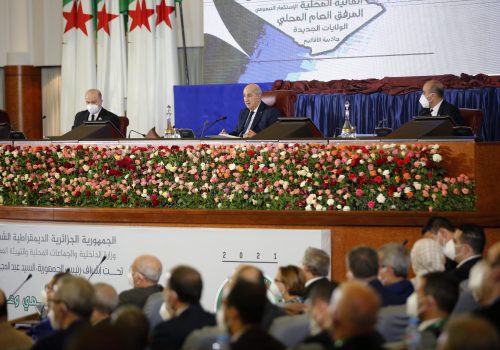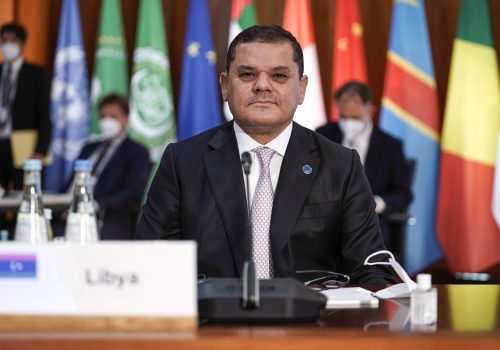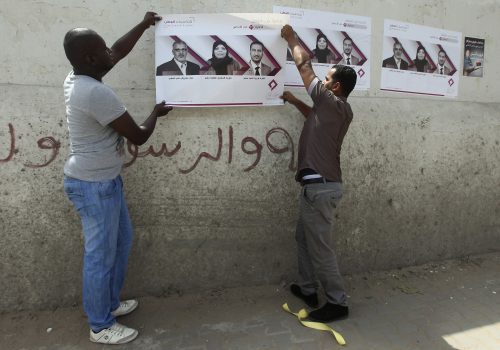North Africa’s transatlantic relations: How the US can engage its European allies in North Africa
Mounting tensions between Algeria and Morocco over Western Sahara, political uncertainty in Tunisia, and national elections in Libya are all critical junctures in North Africa’s prospects for regional security and stability. As Russia’s invasion of Ukraine continues, US and European partnership and collaboration in North Africa becomes imperative to protecting shared values across the region.
On February 24, the Atlantic Council’s North Africa Initiative held a virtual event and panel discussion on “North Africa’s transatlantic relations amidst change and continuity” moderated by Karim Mezran, director of the Atlantic Council’s North Africa Initiative.
The event featured Karen Sasahara, Deputy Assistant Secretary of State for North Africa; Alfredo Conte, Principal Director for the Mediterranean and the Middle East, Italian Ministry of Foreign Affairs; Steven Cook, Senior Fellow for Middle East and Africa Studies, Council on Foreign Relations; Dalia Ghanem, Senior Resident Scholar, Malcolm H. Kerr Carnegie Middle East Center; and Thomas D. Smitham, Charge’ d’Affaires, US Embassy to Italy.
The discussion stressed the importance of transatlantic cooperation in North Africa for Italian and greater European strategic security, and the critical need for engagement to see sustainable political reform in the region.
Thomas Smitham opened the event by addressing the significance of transatlantic cooperation in the Middle East and North Africa (MENA) to regional security, stability, and economic growth. In recent discussions with Italian officials, Smitham notes that the Sahel and Horn of Africa are also critical to North African and Italian security. Italy is key to US engagement in North Africa and, by working in close collaboration with European allies, Smitham is optimistic for democratization and developing good relationships with North African countries.
Remarks from Keynote Speaker Karen Sasahara
Karen Sasahara highlighted that each country in North Africa has critical challenges as well as key opportunities. Morocco is a regional leader for socio-economic reform, infrastructure development, climate action, and trade. Algeria has been vigilant in its fight against terrorism and its involvement in The African Union Mechanism for Police Cooperation. Egypt has been releasing political prisoners and making strides toward social reform by developing laws against female genital mutilation.
However, Sasahara underscored that each country in North Africa shares the challenge of being driven by a domestic political agenda that takes priority over human rights and values. Furthermore, the importance of civil society and free political speech in each country is undermined by the political processes in their respective governments. She argues that Tunisia needs institutional reform for a resilient democracy and that civil society must be included in the country’s political aspirations. Libya is in the midst of developing governance that applies common respect for the rule of law, human rights, and accountability, and must institute free and fair elections for viable results. Moreover, Algeria’s lackluster election outcomes and the continued prosecution of activists have been fueling internal tensions.
At the end of her remarks, Sasahara notes that North African countries must work to develop solutions to internal and regional turmoil through cooperation under the shared values of climate, human rights, and democracy, and the United States and Italy will continually support them in reaching these goals.
North Africa’s Transatlantic Relations Panel Discussion
Alfredo Conte began the panel discussion by asserting that North Africa cannot be considered as an isolated entity—the political dynamics of the Sahel and the greater Middle East are essential to creating policy that takes stock of multifaceted relationships between countries in North Africa. He argues that a strong partnership between the US and Europe should be rooted in common goals across the region, mentioning that Italy is working with allies to forge a taskforce dedicated to safeguarding Libyan democracy. While in Tunisia, Conte argues that more needs to be done—outside actors with destabilizing agendas can hurt transatlantic efforts in Tunisia
Steven Cook underlines that he has long criticized the short-sightedness of US foreign policy in relation to North Africa. He argued that the crises around energy, counterterrorism, struggle for democratic systems, migration, and European security have emphasized the importance of North Africa to the US. Cook highlighted vital examples of each of these crises. Algeria’s oil and gas reserves serve to be incredibly crucial for European energy needs, especially in a time of crisis and uncertainty in Ukraine and Eastern Europe. Additionally, the threat of extremism continues to be a significant policy issue for the region.
Cook posited that the development of democratic governance in Algeria, Tunisia, and Libya must be led by their own societies and that migration via North Africa continues to impact European security and have a distorting effect on politics in Europe. He also underlined that Russia’s increasing push for influence into MENA is a sound argument favoring stronger consolidation of NATO and a more united Europe for global security.
Dalia Ghanem brought a unique perspective to European involvement in the region. She asserted that US and European allies tend to discuss policy in MENA as a whole, even though each country has its own domestic conflicts. Although there are trends that track along the entire region, the US and European approach to North Africa has fallen under the same umbrella of policy as the remainder of the Middle East. Ghanem argued that past US foreign policy in the Middle East has created skepticism with its European allies and has led to limited cohesion in developing coordinated policy for the region. Furthermore, she discussed how the US and the European Union (EU) are prioritizing China and Russia, noting that the strategic ineffectiveness of the transatlantic response in North Africa has bolstered Russian and Chinese influence. Russia has been regaining influence in North Africa, particularly through strong ties with Algeria, where Russia supplies 80 percent of their weapons. She concluded that the United States and European Union aren’t looking in the same direction when it comes to action in North Africa and the implications of policy in one country reverberate to others.
In response to Dalia’s argument, Conte claims that part of Italian diplomacy efforts is to understand the value that the European Union brings into North Africa, and that it is easy to conclude that the EU is ineffective in its approaches to the region. He also argues that Libya should allow the EU to be more active in migration issues related to European security. However, Libya should implement its own policies to strengthen their borders. Cook agreed with Conte’s latter argument, saying that the European Union doesn’t have the capacity to build their own initiatives in North Africa and that these initiatives would be far more effective when interlocking with the United States on shared interests, such as Libyan diplomacy.
Main Policy Recommendations
Building upon Ghanem’s argument of strategic ineffectiveness in North Africa, Cook believes that migration, counterextremism, and pushing back on Russian influence in North Africa are vital grounds for collaboration—an attempt to fix the politics of the region is too ambitious, even if the US and EU work together. Ghanem responded by mentioning that the EU is a “big machine” but is difficult to bring together for collaboration on external issues.
All panelists proposed how the European Union and US can mediate conflict in North Africa. Ghanem mentioned how the Abraham Accords and Morocco’s exchange for Western Sahara quickly deteriorated relations between Algeria and Morocco; trying to solve an issue diplomatically in one part of the Middle East may create tensions in another. Conte and Cook agreed with Ghanem on this perspective, asserting the importance of coordination and regional implications when developing policy. Cook raised the question: “Do we have enough appreciation for the complexity of these issues?”
Mezran circled back to Ghanem’s point on Europe’s limited involvement in the region, asking the panelists if there should be a different approach to policy. Cook believes that if the goal is to repair Tunisian and Libyan politics, then policy will continue to be ineffective, claiming that other areas of coordination would benefit these countries and their populace. Conte agreed, stressing that governance transitions and unity must be self-led and owned—success must come from within. Sasahara jumped in to agree, claiming that, from a US policy perspective, there is a limited ability to create sustainable change externally. While the United States and European Union attempt to promote democratization and engage international support, tensions must be diffused domestically.
Salwa Balla, is a Young Global Professional with the Rafik Hariri and Middle East Programs.
Further reading
Thu, Feb 17, 2022
Algeria’s fate is tied to the Ukraine crisis. Will a war extinguish hope for the country’s popular movement?
MENASource By Andrew G. Farrand
In light of its recent history, Algeria is one country whose fate could swing substantially based on Russia’s actions in eastern Europe.
Thu, Feb 17, 2022
Will Libya have two prime ministers again?
MENASource By Karim Mezran
This political upheaval is the main reason why there is, at least in the short term, a low probability for an armed confrontation to erupt in Libya.
Fri, Jan 14, 2022
Where is the United States? Military basing and energy are the real prizes in Libya.
MENASource By Matthew Zais
It wasn’t a surprise to many that Libya’s long-awaited elections were postponed. As the elections approached, fundamental rules over presidential powers, who was allowed to be a candidate, and election enforcement mechanisms remained unclear.


